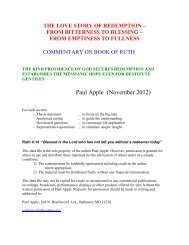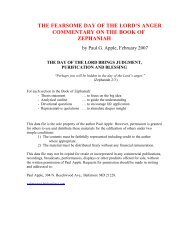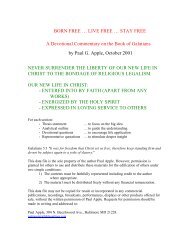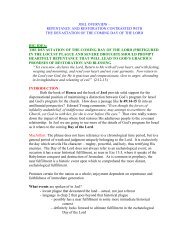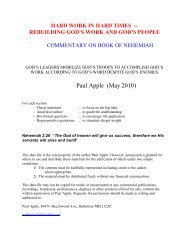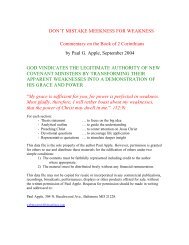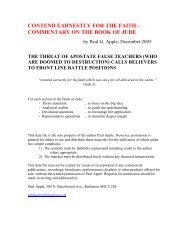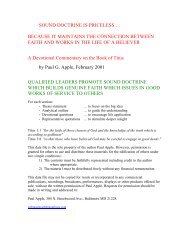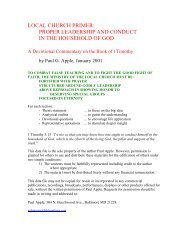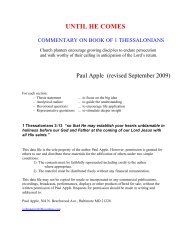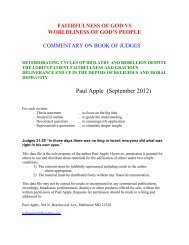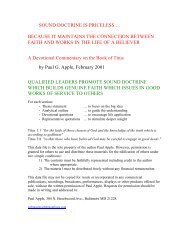in wrath remember mercy . . . the just shall live by faith - Free sermon ...
in wrath remember mercy . . . the just shall live by faith - Free sermon ...
in wrath remember mercy . . . the just shall live by faith - Free sermon ...
Create successful ePaper yourself
Turn your PDF publications into a flip-book with our unique Google optimized e-Paper software.
Why are You silent when <strong>the</strong> wicked swallow upThose more righteous than <strong>the</strong>y? (NAU, emphasis m<strong>in</strong>e)This is a very dangerous argument, <strong>in</strong> my op<strong>in</strong>ion, and one that almost all of us haveemployed at one time or ano<strong>the</strong>r. We know that certa<strong>in</strong> th<strong>in</strong>gs are s<strong>in</strong>, but we generallyhave different categories of s<strong>in</strong>. The Jews of Jesus’ day found Jesus guilty ofblasphemy, an unpardonable s<strong>in</strong> to <strong>the</strong>m, and yet <strong>the</strong>y were self-righteous and greedy.They found ways to avoid <strong>the</strong>ir responsibilities to <strong>the</strong>ir parents and, accord<strong>in</strong>g to Jesus,<strong>the</strong>y stole widows’ houses. They oppressed <strong>the</strong> poor <strong>in</strong> <strong>the</strong> process of mak<strong>in</strong>g<strong>the</strong>mselves rich.Blue: A Dialogue with God: Habakkuk Previewed God’s Discipl<strong>in</strong>e of JudahA. Habakkuk’s distress (1:1-4)1. Why is God <strong>in</strong>different to supplication? (1:1-2)2. Why is God <strong>in</strong>sensitive to s<strong>in</strong> and suffer<strong>in</strong>g? (1:3-4)B. God’s disclosure (1:5-11)1. God’s <strong>in</strong>tention of discipl<strong>in</strong>e (1:5)2. God’s <strong>in</strong>strument of discipl<strong>in</strong>e (1:6-11)C. Habakkuk’s dilemma (1:12-17)1. Why would God employ a people of <strong>in</strong>iquity? (1:12-13)2. Why would God endorse a people of <strong>in</strong><strong>just</strong>ice? (1:14-15)3. Why would God excuse a people of idolatry? (1:16-17)Boice: [trac<strong>in</strong>g <strong>the</strong> thought process of Habakkuk]If God is <strong>the</strong> everlast<strong>in</strong>g God – if He was here before anyth<strong>in</strong>g we know came <strong>in</strong>toexistence and will be here after all our problems and enemies have faded away – <strong>the</strong>n<strong>the</strong> Ba<strong>by</strong>lonian <strong>in</strong>vasion is not His last word, however f<strong>in</strong>al that <strong>in</strong>vasion may seem.His relationship to us is more important and more last<strong>in</strong>g. Aga<strong>in</strong>, if God is holy, as Iknow Him to be, <strong>the</strong>n <strong>the</strong> outcome of this <strong>in</strong>vasion (s<strong>in</strong>ce it is be<strong>in</strong>g caused <strong>by</strong> God)will not be evil but good <strong>in</strong> <strong>the</strong> f<strong>in</strong>al analysis. It will accomplish some good purpose. IfGod is sovereign, <strong>the</strong>n <strong>the</strong> <strong>in</strong>vasion is not <strong>the</strong> result of mere chance. God is still <strong>in</strong>control. F<strong>in</strong>ally, if God is <strong>faith</strong>ful, <strong>the</strong>n <strong>the</strong> victory of <strong>the</strong> Ba<strong>by</strong>lonian armies must befor <strong>the</strong> good of God’s people. It does not <strong>in</strong>dicate that God has changed His m<strong>in</strong>d. Hehas not abandoned us. We are still His people.



